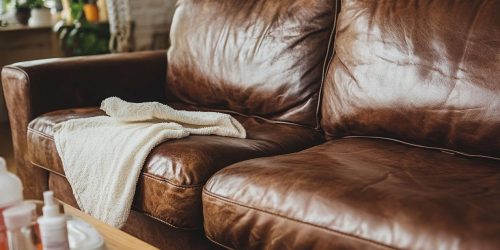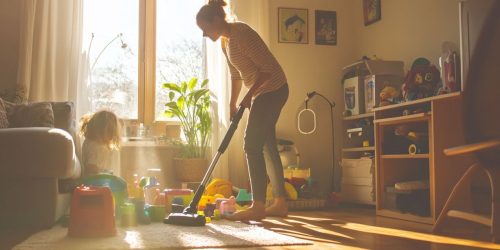How To Limit The Use Of Chemical Detergents In A House With a Newborn
I remember one of the first homes I cleaned after I moved to Wimbledon. The parents had welcomed their baby only a week earlier, and everything in that house felt soft, gentle, and quiet. I found myself tiptoeing from room to room, wiping surfaces with slower hands than usual, as if speed alone might disturb the peace. The mother asked me, in a half-whisper, if we could avoid “strong stuff” from that day onwards. She didn’t mean no cleaning at all. She just wanted the house clean without sharp smells, clingy fumes, or anything that felt too heavy for that tiny new person.
I understood her completely. A home with a newborn feels different. You notice the smell of every spray. You see where your hands go. You think more about fabrics, skin, air, and the small places dust hides.
Over time, I learned there are plenty of ways to keep a home clean without relying on harsh bottled products. You don’t have to scrub less or accept stickiness on the kitchen table. You just choose your methods differently and think a little more about what touches what. Let me share what I’ve seen work in real homes with tiny babies.
Why Reducing Harsh Cleaning Products Matters
Most parents already sense this, but it helps to understand the little details behind it. A newborn’s world is small. Their cot, their mother’s chest, a soft blanket, and the warm curve of a parent’s arm. Everything that touches them or the air around them plays a bigger role than we sometimes realise.
How Newborn Skin And Lungs Respond To Strong Products
Newborn skin has less of a natural barrier than adult skin. It absorbs things more easily. The same goes for their breathing. Their noses and lungs react faster to fumes and strong scents. A cleaner with a sharp smell might seem fine to us, especially if we’ve used it for years, but it can cause redness, sneezing, or dryness for a baby.
Strong sprays also tend to linger long after we finish cleaning. They sit on fabrics, toys, carpets, and cot mattresses. A more gentle cleaning routine avoids all of that.
What Counts As a Chemical Detergent In Daily Cleaning
I find some people think only bleach counts. In truth, many everyday cleaners are filled with dyes, perfumes, solvents, and strong surfactants. Surface sprays, floor cleaners, bathroom gels, antibacterial wipes, laundry liquids, fabric softeners, air fresheners. They all leave something behind.
I’m not against all bottled products. Some are mild and thoughtful. But it’s useful to know which ones are heavy-handed, so you can choose better when you want to.
Gentle Cleaning Methods That Still Work Well
You can keep the house fresh and tidy without buckets of products. The trick is to use the right tools for the right jobs.
Soap And Warm Water For Many Daily Tasks
I clean baby feeding areas, high chairs, table tops, pram handles, and toys with nothing more than a small amount of simple soap in warm water. It deals with most everyday spills. It keeps surfaces clean enough for small hands that go straight to small mouths.
The key is wiping and rinsing well. Many people rush this part. A clean, damp cloth removes residue and leaves things pleasant to touch.
Using Microfibre Cloths To Lift Dust And Grime
Microfibre cloths feel like magic sometimes. They trap tiny particles rather than pushing them around. You can dust furniture, wipe windows, polish taps, and even handle greasy splashes on the hob with barely any product at all.
I keep a dry one for dusting and a damp one for wiping. Fresh water does a surprising amount of work.
Steam For Deep Cleaning Without Residue
A small steam cleaner can save your back and your nerves. It softens stuck-on food around the cooker. It freshens the bathroom. It deals with floors without needing a bucket of cleaner. It kills germs through heat alone.
You don’t need a huge expensive model. A handheld steam unit is enough for most flats and houses.
Natural Ingredients That Help Keep The Home Fresh
Cupboards hold a few things that clean very well on their own. People used them long before bottles filled supermarket shelves.
White Vinegar For Limescale And Grubby Glass
White vinegar cuts through mineral buildup around taps and shower heads. I mix one part vinegar with one part water in a spray bottle. It also clears smears on glass. The smell can seem sharp at first, but it fades fast.
I avoid using it on natural stone surfaces because it can mark them. For everything else, it tends to be a reliable friend.
Bicarbonate Of Soda For Odours And Stains
I sprinkle bicarbonate on carpets where pets or damp shoes have left a smell. I let it sit for a bit, then vacuum it up. It absorbs unwanted scents rather than masking them.
It also works as a gentle scrub for the kitchen sink or the oven door. Just wet the cloth slightly and use the bicarb to loosen grime.
Lemon For Freshness And Mild Degreasing
A simple lemon cut in half wipes away oils and leaves a soft, citrus scent. I sometimes rub it over chopping boards, then rinse well. It feels clean without being overpowering.
Mild Castile Soap For Baby-Safe Surfaces
Castile soap is usually made from plant oils. It’s gentle, light, and works nicely on surfaces babies touch every day. I often dilute it in a spray bottle so it lasts longer.
Setting Up The Home To Make Gentle Cleaning Easier
A few small layout choices make cleaning smoother and less stressful.
Room-By-Room Organising To Reduce Dust And Clutter
Dust finds clutter. A crowded shelf collects it faster than a clear one. I’m not talking about a big clear-out. Just keep surfaces simple and tidy. A quick daily wipe becomes easier when there are fewer items in the way.
Clear Labelling And Easy-to-Reach Cleaning Kits
I like to keep a small basket in the kitchen with the basics: a microfibre cloth, a spray bottle with mild soap solution, and a dry cloth for finishing. I keep another basket in the bathroom. When everything is within reach, you don’t turn to stronger products out of convenience or habit.
Airing Rooms Daily To Keep The Home Fresh
A few minutes of open windows changes the feel of the air. It removes stale smells and reduces the need for scented sprays. It also helps reduce humidity, which stops mould in corners and on window frames.
Times When Stronger Products May Still Be Needed
Life happens. Babies spit up. Food spills. Something goes furry in the fridge. You may still need a stronger cleaner sometimes. The trick is to use it with care and only when your gentler methods aren’t enough.
How To Choose Gentler Bottled Cleaners
Labels matter. Look for fragrance-free or low-fragrance versions. Look for words like “sensitive skin” or “dermatologist tested.” Avoid products full of dyes. Short ingredient lists tend to be kinder.
Using Tiny Amounts Safely And Effectively
Most bottles recommend far more than you actually need. A small amount on a damp cloth is usually enough. Spot-clean rather than spraying across a whole surface. It reduces residue and fumes straight away.
Ventilation And Gloves For Safe Use
Open a window. Keep your hands protected. Rinse surfaces with fresh water afterwards. These small steps reduce how much lingers in the air or sticks to your baby’s surroundings.
I’ve learned that you don’t have to overhaul everything at once. You just start with one change, then another. Over a few weeks, your cleaning routine softens. The house feels calmer. You breathe easier. Your baby grows up surrounded by gentler surfaces, softer fabrics, and cleaner air.
A home with a newborn deserves care. You don’t have to be perfect. You just make thoughtful choices, one wipe at a time.


